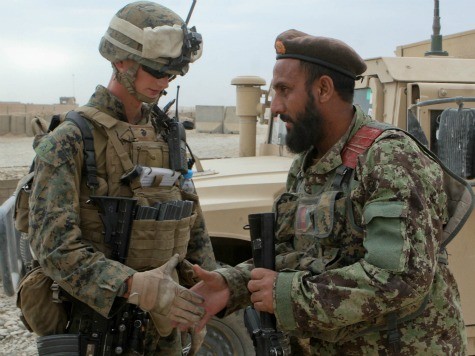The U.S. government, after investing an unprecedented $104 billion of taxpayer funds on nation-building, does not have an anti-corruption strategy in Afghanistan vital to sustaining the gains made in America’s longest war.
Furthermore, according to John Sopko, the Special Inspector General for Afghanistan Reconstruction (SIGAR), the U.S. has spent nearly $8 billion on “failed” efforts to combat the opium trade in Afghanistan, a source of funding for insurgents that threatens stability.
“The consensus among everyone I speak with is that if corruption is allowed to continue unabated it will likely jeopardize every gain we’ve made so far in Afghanistan,” said Sopko in written remarks prepared for a September 12 speech at Georgetown University.
“Corruption destroys the populace’s confidence in their elected officials, siphons off funds that would be used to combat insurgents or build infrastructure, and ultimately leads to a government that is ineffectual and distrusted,” he added.
As an example of corruption, SIGAR mentioned the current presidential election debacle taking place there, which he described as “a crisis spawned from corruption, which many fear is putting Afghanistan’s entire future in jeopardy.”
“So it is clear that the years ahead present real challenges. Most U.S. and coalition military personnel will be gone as we enter 2015, which is also supposed to mark Afghanistan’s ‘Decade of Transformation,'” said Sopko.
However, he continued, “the country remains under assault by insurgents and is short of domestic revenue, plagued by corruption, afflicted by criminal elements involved in opium and smuggling, and struggling to execute basic functions of government. In fact, they haven’t even resolved their recent presidential runoff election yet.”
The inspector general explicitly mentioned that the U.S. efforts to combat the opium trade in Afghanistan have been a failure.
He said that “the U.S. has already spent nearly $7.6 billion to combat the opium industry. Yet, by every conceivable metric, we’ve failed.”
With minimal chance for improvement, the counter-narcotics situation is “dire,” according to Sopko.
“The narcotics trade poisons the Afghan financial sector and fuels a growing illicit economy,” he said. “This, in turn, undermines the Afghan state’s legitimacy by stoking corruption, nourishing criminal networks and providing significant financial support to the Taliban and other insurgent groups.”
SIGAR pointed out that U.S.-funded Afghan security forces “are reaching arrangements with rural communities to allow opium poppy cultivation, even encouraging production to build local patronage networks and generate illicit income.”
Sopko is “astonished” that despite the gravity of the problem, “the counter-narcotics effort isn’t a top priority during this critical transition period and beyond.”
No one in the U.S. government agencies involved in the efforts has “been able to convincingly explain to me how the U.S. counter-narcotics efforts are making a meaningful impact on the narcotics trade or how they’ll have a significant impact after the 2014 transition,” he added. “That’s troubling. Without an effective counter-narcotics strategy and Afghan political will to tackle this problem, Afghanistan could well become a narco-criminal state in the near future.”
The U.S. has spent an unprecedented amount on Afghanistan reconstruction in excess of $104 billion with the purpose of building Afghanistan’s government and security forces, improving its economy and infrastructure, expanding access to health care and education, and making improvements to the standard of living and rule of law there.
In no other time since the founding of the nation, has that much money been spent on reconstructing a foreign country.
Nevertheless, SIGAR emphasized that “there has been no progress made toward developing a unified anti-corruption strategy. In fact, things could get worse with the drawdown.”
According to Sopko, the U.S. will continue spending billions annually after the end of President Obama’s military drawdown.
“It is widely believed the U.S. will continue to fund reconstruction at another $5 billion to $8 billion annually for years to come,” he said.
Under Obama’s plan, U.S. military presence in Afghanistan will shrink to 9,800 troops by December of this year and to an estimated 5,000 by the end of 2015.
“It appears we’ve created a government that the Afghans simply cannot afford,” said Sopko.
“Accordingly, when we build things the Afghans can’t use, and when we don’t take their resources into account, we’re not just wasting money; we’re jeopardizing our mission of creating a self-sustaining Afghanistan that can keep insurgents down and terrorists out.”

COMMENTS
Please let us know if you're having issues with commenting.